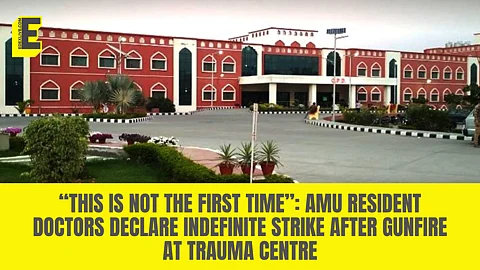

In a chilling episode that has reignited long standing grievances, the Resident Doctors’ Association (RDA) of Jawaharlal Nehru Medical College and Hospital (JNMCH), Aligarh Muslim University (AMU), has announced an indefinite strike including emergency services after multiple gunshots were fired inside the hospital’s Emergency and Trauma Centre on the evening of April 22, Tuesday.
According to the report by Medical Dialogues, the violence erupted following a brawl between two student groups, which had originated earlier at a horse show on the university grounds.
The fight spilled over into the hospital premises, culminating in a shocking gunfire incident near the triage area. Though no casualties were reported among the medical staff, panic gripped doctors, nurses, and patients alike.
But for resident doctors, this was not just a random act of violence, it was a tipping point.
“It’s not only happening this time. It has been occurring for tens of years, and every time a GBM (General Body Meeting) is called, authorities promise security, but nothing ever happens,” said Dr Mohd Hazique Siddiqui, Junior Resident (JR2), Orthopaedics, and nominee for Vice-President in the upcoming RDA elections. Dr Hazique was present at the centre when the incident unfolded.
In a unanimous resolution passed after an emergency GBM on April 22, resident doctors raised five urgent demands:
Deployment of trained police or ex-military personnel at the Trauma Centre instead of the Proctorial Team.
Installation of metal detectors at all volatile entry and exit points within 48 hours.
Swift legal action against the identified assailants.
Resignation of the Medical Superintendent and Proctor for failing to prevent the attack.
Separate triaging arrangements for students and university staff to avoid future altercations.
“We are the first ones in direct contact with patients,” Dr Siddiqui emphasised. “So, what about our security? Assurances and Proper measures should be taken so that we feel safe. Otherwise, we cannot work in this situation.”
He further explained the cyclical nature of such incidents: security is briefly tightened after every violent episode, only to vanish within days. “It is only a matter of time before these changes vanish,” he said.
This lack of continuity has led to mounting frustration among the resident doctors, who claim they have repeatedly warned about the need for better security.
“Every time something like this happens, they give us false assurances and hopes and expect us to withdraw our demands,” Dr Siddiqui said. “But this time, we will not back down until serious, long-term measures are implemented.”
The RDA is now demanding an official blueprint outlining permanent security reforms. They warn that symbolic or temporary measures like last-minute deployments or brief installations of metal detectors will no longer be enough.
“Gunshot is a serious issue. Fortunately, no one was injured. But what if a doctor had been hit? What would have happened then?” he asked. “No one knows who will be the next target.”
EdexLive tried to reach Prof Syed Amjad Ali Rizvi, Medical Superintendent of JN Medical College Hospital, for a comment regarding the incident. The copy will be updated when a response is received.
